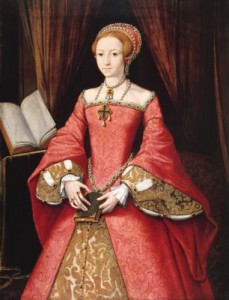 The earliest surviving letter we have written by Elizabeth I was written on this day in 1544 when Elizabeth was aged ten. It was written in Italian and in an italic hand, and the recipient was Elizabeth’s stepmother, Queen Catherine Parr, who was acting as Regent while Henry VIII was in France.
The earliest surviving letter we have written by Elizabeth I was written on this day in 1544 when Elizabeth was aged ten. It was written in Italian and in an italic hand, and the recipient was Elizabeth’s stepmother, Queen Catherine Parr, who was acting as Regent while Henry VIII was in France.
Here is a translation of that letter:
“Inimical fortune, envious of all good and ever revolving human affairs, has deprived me for a whole year of your most illustrious presence, and, not thus content, has yet again robbed me of the same good; which thing would be intolerable to me, did I not hope to enjoy it very soon. And in this my exile I well know that the clemency of your highness has had as much care and solicitude for my health as the king’s majesty himself. By which thing I am not only bound to serve you, but also to revere you with filial love, since I understand that your most illustrious highness has not forgotten me every time you requested from you. For heretofore I have not dared to write to him. Wherefore I now humbly pray your most excellent highness, that, when you write to his majesty, you will condescend to recommend me to him, praying ever for his sweet benediction, and similarly entreating our Lord God to send him best success, and the obtaining of victory over his enemies, so that your highness and I may, as soon as possible, rejoice together with him on his happy return. No less pray I God, that He would preserve your most illustrious highness; to Whose grace, humbly kissing your hands, I offer and recommend myself.
From St. James’s this 31st July.
Your most obedient daughter, and most faith servant, Elizabeth”
You can see a photo of the original letter at http://elizregina.files.wordpress.com/2013/06/exile-letter-001.jpg
Source
- ed. Everett Green, Mary Anne (1846) Letters of royal and illustrious ladies of Great Britain:
from the commencement of the twelfth century to the close of the reign of Queen Mary, Volume 3, p176-177